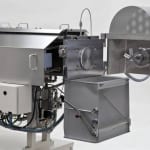 A ZSK twin screw extruder from Coperion GmbH, Stuttgart/Germany, formerly Werner & Pfleiderer, will soon go into service in Uganda for the production of pre-gelatinized matooke flour from non-storable plantains, also known as green or cooking bananas.
A ZSK twin screw extruder from Coperion GmbH, Stuttgart/Germany, formerly Werner & Pfleiderer, will soon go into service in Uganda for the production of pre-gelatinized matooke flour from non-storable plantains, also known as green or cooking bananas. The flour is simply stirred into hot or cold water to make matooke, which is a staple and easily digestible Ugandan meal. The ZSK 54 MEGAvolume PLUS twin screw extruder has been purchased by the Presidential initiative for Banana Industrial Development (PIBID), which is part of a project aimed at promoting the sustainable production of plantains in Uganda, increasing local added value and at the same time improving the nutrition of the population.
The new production process, which has been specially tailored to the capabilities of local farmers, targets the production of flour which will be transported and stored at the PIBID production centre at Bushenyi, where the new ZSK MEGAvolume PLUS twin screw extruder, equipped with 54 mm diameter screws and a seven-barrel process section, is to be installed. A solids conveying and metering system feeds the plantain flour into the extruder, while a fine jet of water is injected into the second barrel of the process section. The cooking extrusion process now commences and the plantain flour is extruded at a typical temperature of between 140 and 150 °C into a modified, pre-gelatinized flour. Downstream of the extruder’s process section is a modified version of the Coperion ZGF 70 centric pelletizer, which is axially displaceable.

This way the knife rotor can be attached to the die plate while the extruder is in operation. Due to the vernier adjustment with scaling an absolutely precise cut is possible. Coperion will show the ZGF centric pelletizer on Anuga FoodTec (27.3. – 30.3.2012, Cologne/Germany). The pelletizing system produces a directly expanded extrudate that can then be readily milled into soluble matooke flour after it has been dried.
The twin screw extruder and the pelletizing system fully meet the standards and requirements of the food industry. All parts of the extruder that come into contact with the product have been specially selected for food processing application. The outer surfaces of the process section are chemically nickel-plated. All oils and lubricants are conform to FDA standards. The splash water protected design and the stainless steel cladding facilitate cleaning.
Dr. Florence Muranga, Director of PIBID, and further representatives of the initiative came to Stuttgart for the factory acceptance test (FAT). The completely assembled extrusion line was tested at Coperion’s food test lab using the original product. Also attending the tests in Stuttgart was Dr. Albert Esper of Innotech Ingenieursgesellschaft mbH, Altdorf. This engineering company specializes in processing technology applications in tropical and subtropical regions and was of invaluable assistance to the intercultural dialogue between PIBID and Coperion.
For the development of the innovative value creation chain from the raw plantain to instant matooke flour, Dr. Florence Muranga was able to draw on the results of her research work at the former Federal Centre for Cereal, Potato and Lipid Research (now the Max Rubner-Institute), Detmold/Germany, where she had already experimented with the ZSK 40 twin screw extruder as a means of processing matooke flour.
Asked about the tasks and objectives of PIBID, Dr. Muranga replied: “PIBID has set the task of involving the plantain-growing rural farmers of Uganda in the value creation chain to a much greater extent and to network them with the processing companies along this value chain. PIBID makes know-how and technologies available both to the rural farmers and the downstream processing companies. Our educational and training work embraces the efficient and sustainable cultivation of the plantains, the development of individual enterprises and production processes and the assurance of high quality all along the chain from the raw to the finished matooke product. This locally produced foodstuff is particularly important for the nutrition of schoolchildren, malnourished infants and people weakened by AIDS. Put briefly: PIBID aims to establish, over the short term, a well-functioning, decentralized production and supply process that will lead to a greater generation of income, not only locally and regionally but also for the state of Uganda as a whole.”



